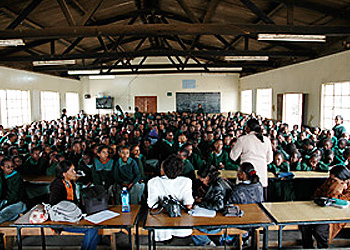 The MGEF Community Education Program is designed for immediate impact. It will take as much as 16 years to educate one girl, who will then be able to make her own decisions about her life and her family. Our workshops are a stop-gap measure to accelerate the acceptance of educating girls, and to reduce teen pregnancy, FGM, early marriage, and the spread of HIV, all significant factors contributing to girls’ dropping out of school. We also address the need among Maasai women for economic self-suffiency by offering business training specifically for rural Maasai women.
The MGEF Community Education Program is designed for immediate impact. It will take as much as 16 years to educate one girl, who will then be able to make her own decisions about her life and her family. Our workshops are a stop-gap measure to accelerate the acceptance of educating girls, and to reduce teen pregnancy, FGM, early marriage, and the spread of HIV, all significant factors contributing to girls’ dropping out of school. We also address the need among Maasai women for economic self-suffiency by offering business training specifically for rural Maasai women.
Click the buttons below for more information on our workshops:
For Elders and Mothers For Women
Life Skills Workshops for Girls
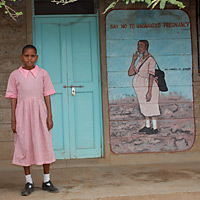
Why
MGEF’s Life Skills Workshops for Girls were created in response to the high dropout rate of teenage girls in Kenya’s Kajiado County. While attributable to many social, cultural, and economic factors, girls drop out of school primarily because:
- Their fathers decide to marry them off
- They get pregnant
Female circumcision also contributes to girls’ dropping out of school. HIV/AIDS has become another significant, increasing factor in recent years, as it has spread rapidly through the County, and girls are often required to drop out of school to take care of ailing parents and younger siblings. In addition, statistics indicate that girls between the ages of 15 to 24 are four to six times more likely to become infected with HIV than their male peers.
Adolescence is a period of transition, growth, exploration, and opportunities. It is also a time of heightened vulnerabilities. Adolescents typically are poorly informed about how to protect their sexual health. As a result, girls are susceptible to unwanted pregnancies and health risks associated with early pregnancy, unsafe abortions, and sexually transmitted diseases. Estimates for the number of girls undergoing FGM among the Maasai are as high as 90%.
Curriculum
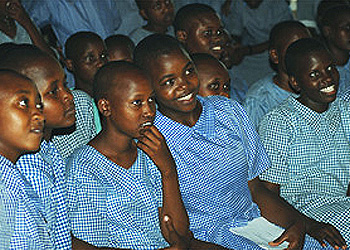 Girls learn the life skills that can prevent teen pregnancy, reduce early marriages, defend against pressures for casual sex, and reduce the spread of HIV and other sexually transmitted diseases. They learn how a woman gets pregnant and the social skills to prevent teen pregnancy. They learn about female circumcision (FGM—female genital mutilation), about which they know nothing until they have undergone the procedure. Once circumcised, a Maasai girl considers herself a “woman,” and no longer a child who attends school. And they learn that FGM and marriage before the age of 16 are illegal in Kenya, and that some enlightened chiefs and the police will protect girls from both. The agenda will include discussion of child rights, the value of education, and an element to generate pride in being a girl. This is especially important in a culture where girls are valued only as an asset to be traded for economic gain and where deference to men (and boys) is mandated.
Girls learn the life skills that can prevent teen pregnancy, reduce early marriages, defend against pressures for casual sex, and reduce the spread of HIV and other sexually transmitted diseases. They learn how a woman gets pregnant and the social skills to prevent teen pregnancy. They learn about female circumcision (FGM—female genital mutilation), about which they know nothing until they have undergone the procedure. Once circumcised, a Maasai girl considers herself a “woman,” and no longer a child who attends school. And they learn that FGM and marriage before the age of 16 are illegal in Kenya, and that some enlightened chiefs and the police will protect girls from both. The agenda will include discussion of child rights, the value of education, and an element to generate pride in being a girl. This is especially important in a culture where girls are valued only as an asset to be traded for economic gain and where deference to men (and boys) is mandated.
Life Skills Workshops for Boys
Why
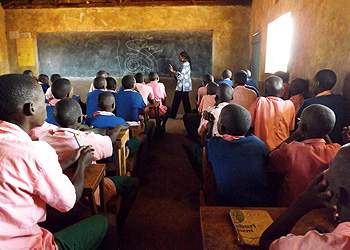 In the Maasai culture, boys are more highly regarded and privileged, and they have been socialized to believe that they are superior to girls. Unfortunately, the result is that girls have been made to feel inferior. These culturally instilled attitudes have led to sexual violence against girls, and nonconsensual sexual relationships leading to pregnancy.
In the Maasai culture, boys are more highly regarded and privileged, and they have been socialized to believe that they are superior to girls. Unfortunately, the result is that girls have been made to feel inferior. These culturally instilled attitudes have led to sexual violence against girls, and nonconsensual sexual relationships leading to pregnancy.
Curriculum
The goals of these workshops are to instill respect for girls and women and to reduce teen pregnancy, FGM, the spread of HIV and other sexually transmitted diseases. Boys will learn about how HIV and other sexually transmitted diseases are spread and how to prevent it, with emphasis on demystifying and destigmatizing the condom. They will learn how a woman gets pregnant. There will be discussion of the inequality of the consequences when a girl gets pregnant: the boy has no responsibility and goes on with his life; the girl has to drop out of school and be forced to marry any man who will take her, while the father has to settle for a lower bride price. The agenda will include discussion of child rights, the value of education, and respect for women.
Workshops for Elders and Mothers
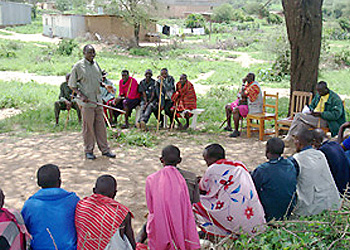
Why
In Maasai society, men have all the decision-making power, and are, therefore, essential to achieving the MGEF’s goals. The majority of mothers want their daughters to get an education, but they have no authority to change cultural beliefs and practices. They do not have a “right” to stop circumcision of their daughters, or prevent early marriages, or demand that their husbands use condoms or be faithful.
Curriculum
Workshops for Elders and Mothers address age-old cultural beliefs and practices that contribute to illiteracy among girls and women in the context of a changing world. Fathers and mothers attend separate workshops to discuss the value of girls’ education versus child marriage, the harmful health impact of female genital mutilation, the burden of teen pregnancy on the family, and the dangers of HIV. The workshops aim to raise awareness of the benefits to all of educating daughters and to empower them, as parents, to help their children and the next generation have a better life in a rapidly changing world. Traditionally, men and women do not consult each other on family matters, but at the end of the workshops, they are brought together to summarize what they have learned and decide the way forward.
Business Training Workshops for Women
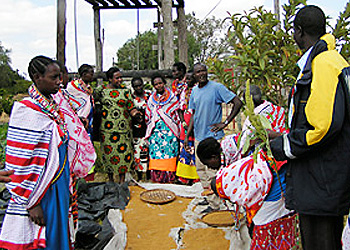 MGEF launched Business Training for Rural Maasai Women in 2010 to reduce poverty and all of its consequences among the Maasai. This program provides business training, mentoring, and seed grants to a generation of women with a 20 percent literacy rate, and brings immediate results by giving them the means to generate sufficient income to provide nourishment, health care, and education for their families. Maasai women know how to work. They build the houses, and repair them; they haul the water and wood, build the fires, milk the cows and goats; they cook the meals, wash the clothes, care for the children. They grow maize, make charcoal to sell, and sell milk wherever they can. But none of these activities produces sufficient income to adequately feed and educate their children. The Rural Women’s Business Training gives women the means to start a business, and the know-how to make it a profitable enterprise. Thus far, 200 rural Maasai women have benefited from our Business Training and resulting in 40 women-owned and managed businesses.
MGEF launched Business Training for Rural Maasai Women in 2010 to reduce poverty and all of its consequences among the Maasai. This program provides business training, mentoring, and seed grants to a generation of women with a 20 percent literacy rate, and brings immediate results by giving them the means to generate sufficient income to provide nourishment, health care, and education for their families. Maasai women know how to work. They build the houses, and repair them; they haul the water and wood, build the fires, milk the cows and goats; they cook the meals, wash the clothes, care for the children. They grow maize, make charcoal to sell, and sell milk wherever they can. But none of these activities produces sufficient income to adequately feed and educate their children. The Rural Women’s Business Training gives women the means to start a business, and the know-how to make it a profitable enterprise. Thus far, 200 rural Maasai women have benefited from our Business Training and resulting in 40 women-owned and managed businesses.
Capacity Building
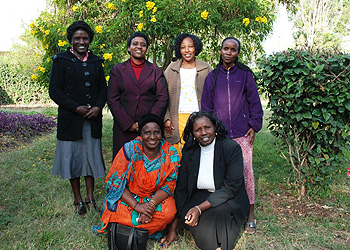
Why
The great strength of the Maasai Girls Education Fund is the engagement of the Maasai community. MGEF believes that the only way to overcome the economic, social, and cultural factors that prevent girls from getting an education is to work on-the-ground with the community. MGEF has included the community in every aspect of its development. From the beginning, women’s advocacy groups, educators, local government officials, chiefs, and parents were consulted to ensure that all perspectives and opinions were considered, and that our work is appropriate to the culture and accepted by its people.
Forms of Partnership
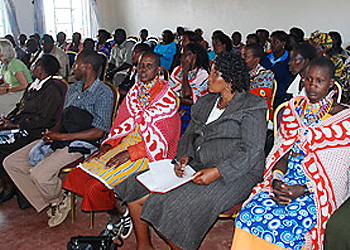 MGEF works in partnership with a community based organization in Kenya, which was created in 2000 specifically to assist MGEF. This partnership model was designed to involve the Maasai community. The Kajiado organization, which has the same name but is not affiliated with the US organization, manages the scholarship program and organizes all MGEF workshops with two staff and 56 volunteers throughout Kenya’s Kajiado County, where two-thirds of Kenya’s Maasai population live. They also act as cultural advisors when designing strategies.
MGEF works in partnership with a community based organization in Kenya, which was created in 2000 specifically to assist MGEF. This partnership model was designed to involve the Maasai community. The Kajiado organization, which has the same name but is not affiliated with the US organization, manages the scholarship program and organizes all MGEF workshops with two staff and 56 volunteers throughout Kenya’s Kajiado County, where two-thirds of Kenya’s Maasai population live. They also act as cultural advisors when designing strategies.
The Kajiado organization works with parents, schools, and students to ensure optimal conditions for each selected student to succeed. They are the eyes, ears, and voice of the Fund, helping to identify needy girls and to bring attention to girls who are at risk of dropping out of school because of circumcision, early marriage, teen pregnancy, poor attendance, peer pressure, poor health, or financial need. All staff, volunteers, and parents attend annual meetings and participate in discussions that affect the future of the organization.
MGEF has also organized governance workshops and provided staff training for the Kajiado organization to strengthen their management skills and ensure good governance.
